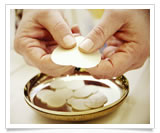by Dr. Jerald C. Joersz
We are longtime Missouri Synod Lutherans who believe in the real presence of the body and blood of our Savior Jesus Christ. However, we and other members of our congregation are offended by a practice recently introduced by our pastor. During the Communion service, he communes himself. Is this proper?
 |
|
© DesignPics |
The Holy Scriptures give us no direction on the question of self-communion by the pastor. The practice must, therefore, be considered a matter of Christian liberty. Decisions about introducing the practice are to be commended to the good judgment and discretion of Christian congregations and their pastors. Patient, mutual discussion can do much to avoid causing offense and communicating misunderstandings. As St. Paul also reminds us, “All things should be done decently and in order” (1 Cor. 14:40 ESV).
Martin Luther and Lutheran theologians who followed him (e.g., Martin Chemnitz) regarded the practice of a pastor communing himself as permissible, as long as it was done within the public worship service in the presence of the assembled congregation. It should be noted that in the centuries following Luther, Lutherans were not always in agreement regarding the practice. Some considered it improper while others permitted it. Dr. C. F. W. Walther, the first president of the Missouri Synod, took up the question in the 1906 printing of his Pastoral Theology, calling attention to Luther’s position in a survey of what other Lutheran teachers said about the topic.
The Altar Book of the LCMS’s new hymnal, Lutheran Service Book, allows a pastor’s self-communion in the following description present in all the Divine Service settings of the LSB: “The pastor and those who assist him receive the body and blood of Christ first, the presiding minister communing himself and his assistants. Then they distribute the body and blood to those who come to receive” (p. 168).
In recent decades, the practice of asking a lay assistant to commune the pastor during the Communion service has become widespread, is considered the preferred option, and without doctrinal objection has been received well. In his 1945 Pastoral Theology textbook (based on Dr. Walther’s earlier work and used at the Synod’s seminaries for many years), Dr. John H. C. Fritz counseled: “Rather than give Communion to himself (which he might legitimately do; of course only in the regular church service and not privately), the pastor should ask the congregation to request a layman . . . to administer the Sacrament to him” (p. 127).
The pastor is a member of the congregation that he serves. He is a Christian and a sinner in need of the Sacrament. The Sacrament, administered according to Christ’s institution, remains valid and beneficial whether the pastor distributes the elements to himself or whether another Christian, such as a lay assistant chosen to do so, distributes it to him.
—
About the Author: Until his retirement, Dr. Jerald C. Joersz was an associate executive director of the LCMS Commission on Theology and Church Relations.
September 2010
Send your questions to “Q&A,” c/o The Lutheran Witness, 1333 S. Kirkwood Road, St. Louis, MO 63122-7295. Please include your name and address. All questions will be considered, but none can be answered individually.






I am also awaiting an answer to this.
what about article 14 of the Concordia is this not part of our doctrine? It says called and ordained to distribute the body and blood. Luther cleared this up in his writings upon the mass in 1523 the celebrant who is called and ordained, partakes as he concecrates the elements